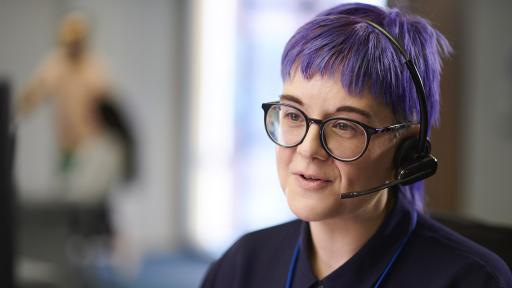Everyone needs to look after their general health, both body and mind, but this can be more important when you have a long-term condition like MS.
Taking an active role in managing your MS rather than being a passive recipient of health care is known as self-management. This doesn’t mean you get less help from health professionals but it does involve taking responsibility for your own health and adopting a dynamic and positive approach. Self-management can help you to manage the things you can control and to deal better with the things you can’t. You are then best placed to face the challenges that living with multiple sclerosis might bring.
You may be experiencing symptoms that have an impact on your usual lifestyle, for example, fatigue, or mobility issues may mean that it's important to pace yourself carefully. Consequently, you may already recognise that you need to make changes to your lifestyle. Alternatively, MS may have little impact on your day to day activities but you'd like to be as well as possible so that you're best able to deal with any relapses, symptoms or other challenge that comes along.
It is helpful to be realistic about what fits into your way of life. The bottom line is that it's your life and your MS. It's up to you how you manage it with the support of health professionals, family, friends and others. It's not possible for anyone to say exactly what you should do but we can offer some suggestions.
Have a good understanding of your MS
Be aware of changes and fluctuations in your MS. Are there any trigger factors that tend to lead to your MS getting worse or being harder to deal with? For instance, maybe your fatigue is worse on a hot day or at a particular time of day, or your symptoms become worse when you are going down with an infection. You'll begin to learn what you can do to improve your symptoms, whether that simply means rest and hydration, or a consultation with a health professional.
Keeping a diary of your MS can be helpful. If you record how your MS alters in response to your activity levels, stress, diet or times of day, you and your health professionals may be able to identify patterns. This can help you to plan your time and to manage your MS effectively. There are also apps available to help you monitor your symptoms, including Cleo, Emilyn, MS energise and many more.
If muscle spasms are a problem for you, our spasticity triggers tool might help you to work out what tends to make them worse.
Dealing with symptoms and relapses
Understanding the patterns of your MS will help you identify when you may need to ask for help with managing symptoms or if you may be going into a relapse. Consider writing down a check list of things you know that you can do for yourself, as well as the contact details of the health professionals and other support services that you can call on.
Some people like to get organised with support in advance, so that they know that they have a friend or neighbour on standby to walk the dog, for example, should their MS worsen. That way, you can have the conversations with friends and family calmly, and reduce worry and stress for you all.
Making an informed choice about treatment
Making a decision is ideally done in partnership with your health professional. Deciding on what treatment is right for you needs to consider the benefits you might expect from the treatment and any potential risks. This needs to take account of non medical factors that may affect your lifestyle, such as when and how medication or a course of treatment is taken, the need to attend appointments, any restrictions of ability to drive.
Before making a treatment choice you may want to find more information and ask a number of questions so that you are fully informed about your options, the benefits and potential side effects of the choice and how the effects will be monitored. We have a number of resources to help with this, including making the most of appointments, questions to ask health professionals, and MS Decisions, which focuses specifically on the disease modifying drugs (DMDs). Alternatively, you can contact our confidential helpline on 0800 032 3839 or email ask@mstrust.org.uk about any aspect of MS.
There are many self-management courses available that aim to teach you skills to boost your confidence and live well with your condition. For information about self-management courses around the country visit the self-management UK website.
- MS specific self-management courses - your MS specialist nurse or occupational therapist may run sessions or courses on managing specific aspects of MS, such as fatigue or for people who have just been diagnosed.
- Expert Patients Programme - is a free six week course for anyone living with a long-term health condition in England or Wales. The programme aims to provide support and develop self confidence to help you feel more in control. Your doctor or local NHS organisation can help you find suitable courses in your area.
The effects of MS may mean that you need to make adaptations to your home, such as adding a downstairs bathroom, installing a stair lift or widen doors.
The symptoms of MS can sometimes interfere with your daily life and make previously straightforward tasks more of a challenge. There's equipment available which can help, along with information and advice on choosing the right equipment to fit your situation.
MS may affect your ability to drive or to use public transport and our A-Z page on driving and transport can help.
For some people travelling with MS may simply mean checking that any medications have been packed. For others it may involve making sure that the facilities available adequately meet your requirements.


